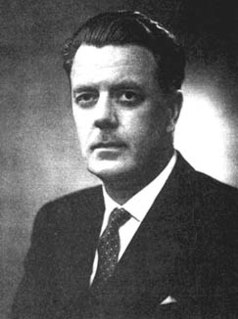A Quote by Wolfgang Pauli
The natural scientist is concerned with a particular kind of phenomena ... he has to confine himself to that which is reproducible ... I do not claim that the reproducible by itself is more important than the unique. But I do claim that the unique exceeds the treatment by scientific method. Indeed it is the aim of this method to find and test natural laws.
Related Quotes
It seems to me that there is a good deal of ballyhoo about scientific method. I venture to think that the people who talk most about it are the people who do least about it. Scientific method is what working scientists do, not what other people or even they themselves may say about it. No working scientist, when he plans an experiment in the laboratory, asks himself whether he is being properly scientific, nor is he interested in whatever method he may be using as method.
Indeed, the most important part of engineering work-and also of other scientific work-is the determination of the method of attacking the problem, whatever it may be, whether an experimental investigation, or a theoretical calculation. ... It is by the choice of a suitable method of attack, that intricate problems are reduced to simple phenomena, and then easily solved.
The physicist, in his study of natural phenomena, has two methods of making progress: (1) the method of experiment and observation, and (2) the method of mathematical reasoning. The former is just the collection of selected data; the latter enables one to infer results about experiments that have not been performed. There is no logical reason why the second method should be possible at all, but one has found in practice that it does work and meets with reasonable success.
If I ask you who is the most famous scientist who ever lived, or the greatest scientist who ever lived you'll say either Einstein or Newton or something like that because their claims were supposed to apply universally. But the claim of somebody who is studying a particular feature of the evolutionary process like whether it's very fast or very slow, or occurs in steps and so on, that's not a universal claim, that's a rather specialised claim and so you can't claim to great fame and great success.
But ... the working scientist ... is not consciously following any prescribed course of action, but feels complete freedom to utilize any method or device whatever which in the particular situation before him seems likely to yield the correct answer. ... No one standing on the outside can predict what the individual scientist will do or what method he will follow.
The Scientific Revolution, that remarkable transformation of European thought that occurred between approximately 1550 and 1700, brought with it an ascendancy of the experimental method and the refusal to believe any explanation of natural phenomena that could not be proven to the satisfaction of the empirical observer.
The scientific method of examining facts is not peculiar to one class of phenomena and to one class of workers; it is applicable to social as well as to physical problems, and we must carefully guard ourselves against supposing that the scientific frame of mind is a peculiarity of the professional scientist.
Whether you are new to the scene or a long-time grillmaster, everyone has unique preferences when it comes to their cooking method of choice. From propane to charcoal to wood, people take their method of grilling quite seriously, and some argue quite passionately about the pros and cons of each method.
The scientific method is the ultimate elegant explanation. It is the ultimate foundation for anything worthy of the name "explanation". It makes no sense to talk about explanations without having a process for deciding which are right and which are wrong, and in a broad sense that is what the scientific method is about. All of the other wonderful explanations celebrated here owe their origin and credibility to the process by which they are verified-the scientific method.


































